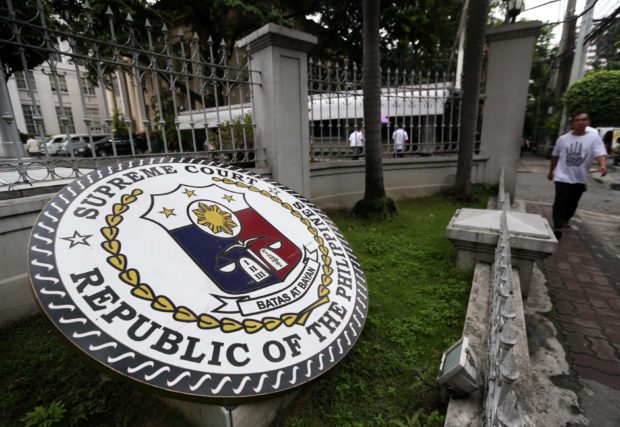
FILE PHOTO: The Supreme Court logo. (INQUIRER/LYN RILLON)
MANILA, Philippines–The Supreme Court (SC) has acquitted four civilians charged with illegal possession of firearms and ammunition and for damaging a telecommunications company’s terminal.
In its eight-page ruling, the SC’s Third Division said the constitutional right to speedy trial of George Bruce, Jose Nayve, Romel Nuñez and Armando Matres have been violated.
At the time of their arrest, Nayve was a coordinator of Pinagkaisang Samahan ng mga Tsuper at Operators Nationwide (Piston) in Cavite, while Nuñez and Matres were construction workers and Bruce a utility vehicle driver.
The four were accused of being members of the New People’s Army (NPA), who were allegedly responsible for firing guns at a fair in Barangay Manggahan in General Trias, Cavite on November 23, 2015.
The four admitted being at the vicinity when they heard the gunshots nearby but denied that they were responsible for the incident. Still, they were arrested by the authorities. They claimed they were interrogated and tortured to admit being members of the NPA.
“After conscientiously sifting through the records of this case, the Court discerns adequate basis to reverse the challenged issuances of the CA (Court of Appeals),” the SC said.
The SC was referring to the April 12, 2019, ruling of the Court of Appeals that dismissed the appeal of the four.
“Criminal Case Nos. TMCR-1096-15, TMCR-1097-15, and TMCR- 1120-17, pending before the Regional Trial Court of Trece Martires City, Branch 23, are dismissed for violation of the petitioners’ right to speedy trial. Petitioners George B. Bruce, Jose C. Nayve, Romel M. Nufiez, and Armando T. Matres are acquitted and are ordered immediately released from custody, unless they are being held for another lawful,” it added.
The SC also directed the jail warden of the Bureau of Jail Management and Penology-Special Intensive Care Area (BJMP-SICA), Camp Bagong Diwa, Bicutan, Taguig to implement its resolution immediately and to submit the action it has taken within five days from receipt of the resolution.
It added that under Section 7 of Republic Act No. 8493 or the Speedy Trial Act of 1998, as implemented by Rule 116, Section l (g) of the Rules of Court, the arraignment of an accused should be held within 30 days from the time the court acquires jurisdiction over his or her person.
But in this case, the SC said the Information (charge sheet) was filed in December 2015 while arraignment that was set on May, 2016 did not push through.
“Ultimately, petitioners were arraigned on September 13, 2018, or more than two years from the filing of the first two Informations in 2015, and after a total of eight postponements…” the SC noted
The prosecutors, according to the Court, also failed to provide reasonable explanation for the postponements of petitioners’ arraignment.
“However, it is not amiss to point out that an arraignment takes, at most, ten minutes of the court’s business and does not normally entail legal gymnastics. It consists simply of reading to the accused the charges leveled against them, ensuring their understanding of those charges, and obtaining their plea to the charges,” the SC said.
“Upon this point, it is axiomatic that a dismissal predicated on the right of the accused to speedy trial upon his motion or express consent, amounts to an acquittal which will bar another prosecution of the accused for the same offense. Perforce, the acquittal of petitioners from the charges must follow,” it added.
RELATED STORY:
4 ‘NPA revolutionary tax collectors’ arrested in Cavite – police